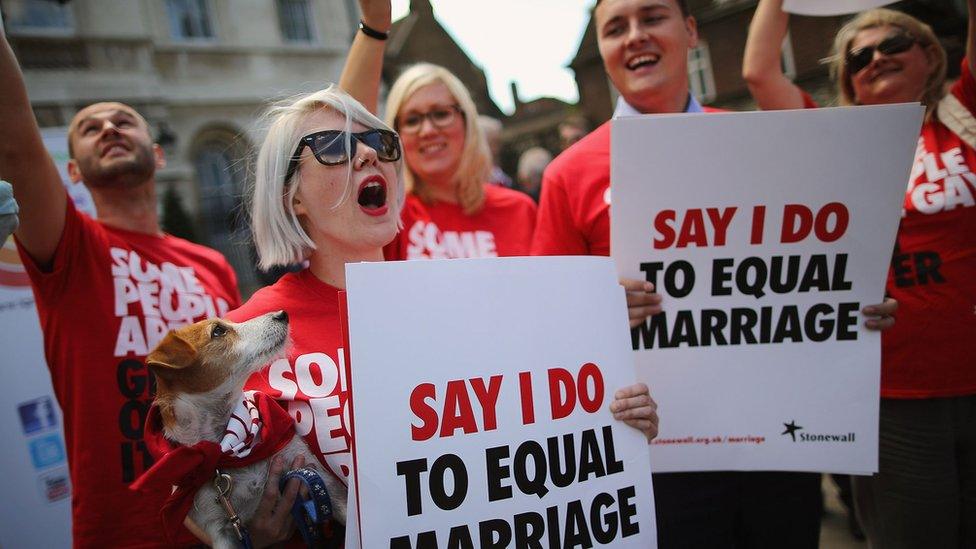British Attitudes Survey: More Britons 'back higher taxes'
- Published
- comments

The poll asked questions around public spending, national security and people's private lives
Nearly half of Britons think the government should raise taxes and increase spending, an annual survey of public opinion suggests.
At 48%, it is the highest proportion to support such measures since 2004, according to the British Social Attitudes survey, external.
The survey also found the public were becoming more sceptical of the EU.
And social liberalism was rising on issues such as same-sex relationships, pre-marital sex and abortion.
There was a more traditional attitude to national security, however, with more than half wanting strong powers on terror.
Roger Harding, head of public attitudes at the National Centre for Social Research, which carries out the survey, said: "People's tolerance for austerity is drying up, even if that means higher taxes.
"This leftwards tilt on tax and spend is matched by a long-running conservatism on national security and law and order. In all, people want a more active state that's firm but fairer."
Here are the key findings of the survey:

Taxes and benefits - Pensions 'not top priority'

48% say they want higher taxes to pay for more spending on health, education and social benefits; 44% say they want it to stay the same and 4% would like to see taxes cut
It is the first time since the financial crash of 2007-8 that more people want more tax and spending than want it to stay the same
21% say that most social security claimants do not deserve help, the lowest ever level on the survey. In 2015, 28% believed this
For the first time in more than 30 years, pensions are not the public's top priority for extra welfare spending, the survey says, and has been overtaken by support for more spending on benefits for people who are disabled
61% of people think it is wrong for benefit claimants to use legal loopholes to increase their payments, compared with 48% who think it is wrong to use legal loopholes to pay less tax.
The view that it was acceptable to use legal loopholes to pay less tax was most strongly felt among people who were better off

National security - 'traditionally conservative'
The survey found that Britain holds "traditionally conservative views" on national security, and the public favoured stronger state powers to tackle terrorism, even before the terror attacks in Manchester and London.
More than half of those surveyed - 53% - would support detaining people indefinitely at the time of a suspected terrorist attack without putting them on trial. UK law restricts this to 14 days
Seven in 10 people believed that authorities should have the right to stop and search people if a terrorist attack is suspected. Currently, a police officer can only stop and search without "reasonable grounds" if a senior police officer has authorised it in advance
80% think the government should have the right to keep people under video surveillance in public areas, while 50% think the government should have the right to monitor emails and information exchanged online
There has been a decline in the proportion of people who say that it is acceptable not to obey a law, even if that law is wrong, to 24%. The highest percentage was recorded 25 years earlier in 1991, when 37% believed this
Four in 10 back more defence spending

Private lives - 'the rise of social liberalism'

75% say sex before marriage is "not wrong at all", up from 42% when the question was first asked in 1983
On same-sex relationships, 64% say they are "not wrong at all", up from 57% in 2013 - the year before same-sex marriage became legal in England and Wales
70% say an abortion should be allowed if a woman decides on her own she does not want the child or if a couple cannot afford any more children
77% of people feel a person with a painful incurable disease should be able to legally request that a doctor end their life

Brexit and immigration
The research - carried out in the months after last year's EU referendum - suggested that views on immigration had become more polarised, with the young and highly educated more likely to believe that immigration was good for the economy, while older people and non-graduates were more likely to say it was bad.
76% of people said the UK should leave the EU or that if it stays the EU's powers should be reduced, up from 65% in 2015
73% of those who were worried about immigration voted Leave, compared with 36% of those who did not say this was a concern
45% of those who trust the government a great deal or tend to trust it voted Leave, compared with 65% of those who distrust it greatly

The survey has been carried out every year since 1983, with questions repeated periodically to assess how opinions change over time.
A total of 2,942 people in England, Scotland and Wales were questioned between July and November last year by social research organisation NatCen.


- Published3 July 2016

- Published30 June 2016

- Published9 February 2016

- Published17 June 2014
